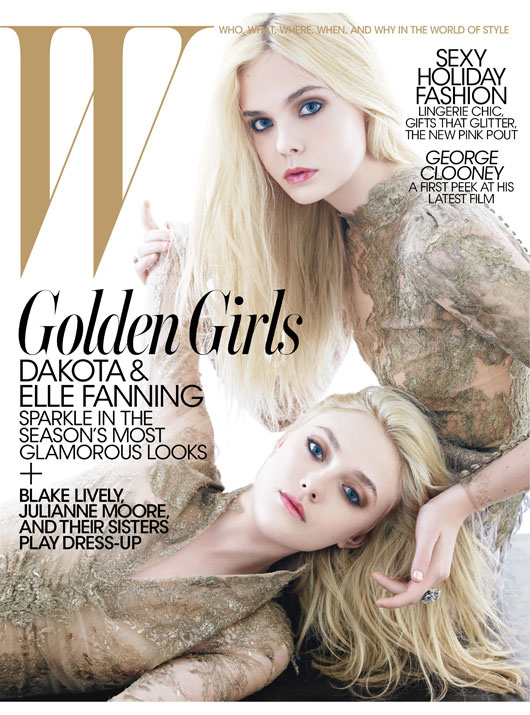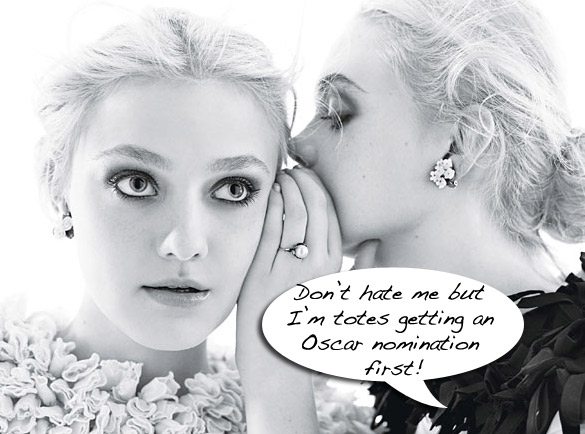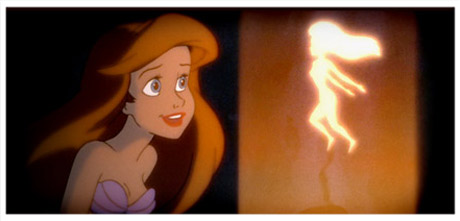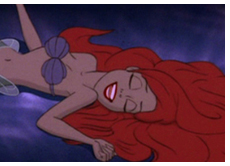Anyone familiar with the basic history of the MPAA ratings board could have predicted it before seeing the movie. Anyone familiar with the concept and players of Shame, Steve McQueen's NYC-based drama about a sex addict (Michael Fassbender) and his self-destructive sister (Carey Mulligan) could have predicted its eventual NC-17 rating without seeing it. It's official now. I predicted this was coming the moment I first heard they were making the movie -- McQueen's previous picture Hunger didn't pull any punches so why would he, uh, pull any thrusting? -- but this shot of Michael Fassbender, naked, haunted and corpselike in his own bed -- I believe it is the film's first shot though perhaps my memory is tricking me? - confirmed it for me.
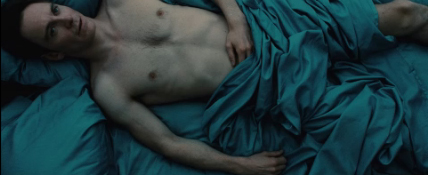
You see, it's always about the power of the images and what they suggest. Sexually, I mean. Show the ratings board any brutality and they won't flinch... or at least they haven't much at all since Natural Born Killers (1994) which initally received an NC-17 for its violent content. (If I recall correctly, Oliver Stone only had to edit out a comic point-of-view shot through a gaping gun shot wound to get the R)
The MPAA, those watchdogs of American consumerism will always allow you the freedom to be a bad parent and take your kids to see nightmarish violence. How many beheadings have we seen in recent R rated films? Every week on The Walking Dead (basic cable, no parental supervision required) you can see multiple face stabbings, beheadings, shootings, and limbs torn asunder. How many torture porn movies have bad parents been allowed to haul their young'uns too? But show the ratings board any "strong" sexuality and America's ancient puritanic DNA will start their blood boiling.
Which is not to say that I don't approve of Shame's official NC-17 rating. I think it's an appropriate rating. There's no reason why someone under 17, unless they were unusually mature for their age or suffering from their own addiction (the Oscar kind. We've all been there: "i must see all films with Oscar buzz!") would have an intense desire to see it or would get much out of it. The problem lies not in the NC-17 rating itself; it's perfectly acceptable, even worthwhile, to have an "adult's only" rating. The problem is in the MPAA's puritanism about the rating, the way they wield it, and in American puritanism surrounding sexuality in general.
Here, from the MPAA's own site are the official descriptions of what constitutes R and NC-17 ratings.
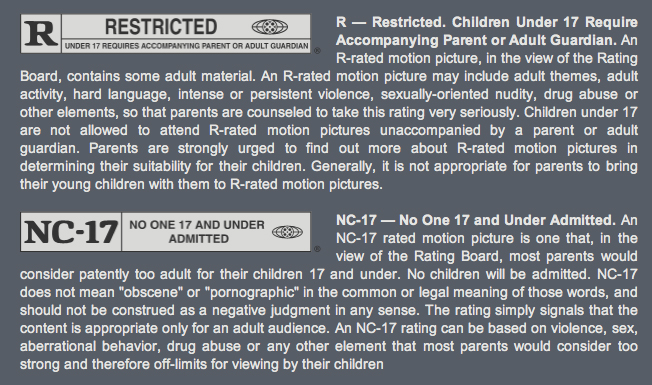
Note that the NC-17...
does not mean "obscene or pornographic".... and should not be construed as a negative judgment."
and that it says that the rating...
can be based on violence, sex, abberational behavior or drug abuse"
When was the last time a movie was ever given an NC-17 rating for anything other than sex?
Abberational behavior, as the documentary This Film Is Not Yet Rated made clear, is a catch-all phrase that basically also means "sex" but particularly of the homosexual persuasion or of that other grotesque affront to patriarchal cultural values: a woman's pleasure. That must see documentary made a very compelling case that for a film to win an R rating, a woman must NOT be seen enjoying herself too much. Closeups of a woman's face in an orgasmic state (no nudity possible in those shots unless she's got really strange anatomy) have often led to NC-17 ratings. This is especially true if the man is in a subservient position (note the frequency of NC-17 decisions where cunninlingus is involved -- hi Blue Valentine!. Edit out a woman's face -- or, better yet, chop off her head in the first place-- and you'll never have to worry about an NC-17.
Enter Shame. It's an interesting case because even if Steve McQueen were willing to edit down to an "R" there is no pleasure that could be edited out. The film is about sexual addiction and most movies about addiction skimp on the pleasure principle. I suppose you'd have to remove the "aberrational" behavior from Shame for an R. And given how loosely the MPAA defines that, it would become a short film... or at the very least a much shorter film since you'd have to edit out the entire darkly operatic sexual abandonment finale and probably all shots of Michael Fassbender's ginormous wang.
When NC-17s were first given filmmakers complained that it meant that there film wouldn't be seen. Many newspapers refused to run ads (punitive) and many theater chains refused to exhibit them (punitive) which is a shame considering the rating...
should not be construed as a negative judgment."
But again... the problem is not the rating, which is a perfectly valid one in this movies case. It's that that other ratings mean so little and this rating means only sex.
Each week I'm alarmed to see on TV what you could only see in R rated movies in the 80s. The Walking Dead and just about every procedural would have (easily) been rated R for violence just 30 years ago. Now we ingest violence like oxygen. If the R means nothing... why does the NC-17 still have such stigma? Why is American culture still so mortified by things it sees in the mirror every day and enjoys using regularly (I've never seen you naked but I'm guessing you have either a penis or a vagina, and that you've occasionally used / enjoyed it) and still so wildly accepting of something that most of us would never ever want anyone we love to encounter in real life (beheadings, massacres, shootings)? Even more troubling, why are we so flippant about bombarding young children with violence and so terrified that they might catch a glimpse of the sexuality that awaits them when they themselves become adults?
You can ask these questions until you turn blue and there are never any suitable answers... or at least no forthcoming solutions. Perhaps we're just self-destructive as a species, in love with things that only harm us and afraid of things that can actually bring us joy.
I think we owe it to Steve McQueen and future filmmakers to pay for Shame in the theaters. And I hope the Academy voters realize they owe it to future filmmakers to give NC-17 a real fighting chance. Artists need to have the option of creating art for other adults and adults need art that is specifically for them. Man cannot live on Disney alone. And contrary to the handwringing doomsday scenarios of all articles on the NC-17 rating, it isn't actually the kiss of death financially. Several films released with NC-17 or as "unrated" have done fairly well for themselves given the narrow arthouse margins they were already going to be working within.
Some stats to send you on your violence-loving, sex-hating way. (sorry to confuse you with the MPAA and John Q Public.)
 Top Grossing NC-17 Films in US Release
Top Grossing NC-17 Films in US Release
1. Showgirls (1995) $20 million
2. Henry & June (1990) $11 million
3. The Cook The Thief His Wife and Her Lover (1990) $7.7
4. Bad Education (2004) $5.2 million
5. Lust Caution (2007) $4.6
Oscar Nominations For NC-17 Films
Henry & June (1990) best cinematography
and yes... I believe that's it. Just one nomination for all NC-17 films. Does Oscar disrespect the rating even more than the MPAA? Can Shame be the game changer the industry and the Oscars need when it comes to filmmaking for adults?
 Thursday, January 26, 2012 at 9:49PM
Thursday, January 26, 2012 at 9:49PM 





